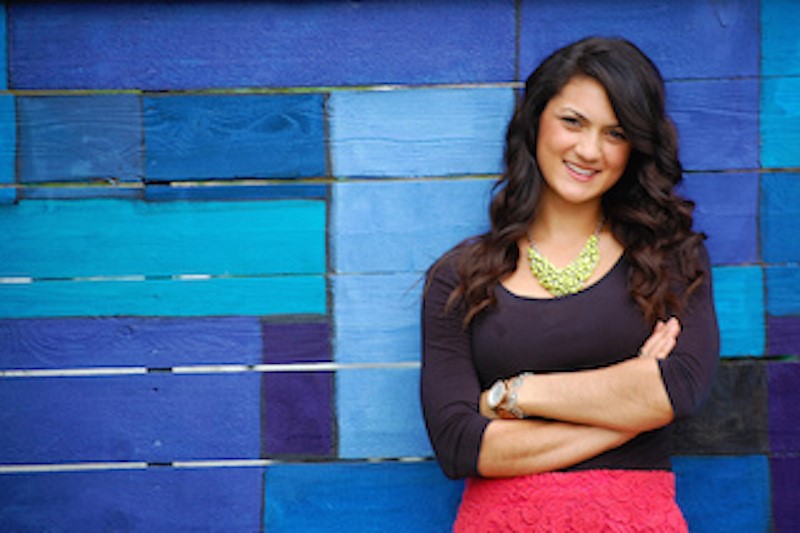Topic Tuesday: Gratitude
“Gratitude as the ‘Gamechanger'” (By: Maria Grasso)
People who know me i n the most recent “space” in my life have a hard time believing that I went through (am always going through, yeah?) an eating disorder. Does anyone else ever get that? “You? No way.” Me, yes way.
n the most recent “space” in my life have a hard time believing that I went through (am always going through, yeah?) an eating disorder. Does anyone else ever get that? “You? No way.” Me, yes way.
See, I am addicted to serving others. It’s the cornerstone I’ve built my life on and if you kick it out from under me, I might just crumble. Those who know me, know this, of course, and can’t imagine how someone who has “so much concern for others” could ever fall into the “selfish” arms of anorexia.
But see, when you are knee deep in ED you don’t feel selfish at all. In fact, you feel selfless, often focusing on the needs of others more so than yourself.
Here’s the problem, though: I think we misunderstand selflessness greatly.
Selflessness is NOT about shifting the focus off of you onto others. It’s easy to lose yourself even further into ED’s world when you abandon yourself for the sake of others.
Selflessness is NOT just a cop-out strategy to utilize so that your involvement in the lives of others overshadows your own needs.
Selflessness IS about changing the game we play, though. And yes, I called it a game.
Perfectionism was my sport and I was captain of the varsity squad. In the trenches of my battle, I spent two summers in rural South Africa and Namibia immersed in the communities of the poorest of the poor. I don’t want to sell myself short here, but let’s be honest: I was shifting the focus not changing the game.
Shifting the focus onto others helped me ignore what was going on inside myself, ultimately causing my ED to grow wildly out of control.
If we aren’t careful, our “good deeds” can harm us. What I thought was “selfless” might end up being the most “selfish” action of my life. See, I didn’t want people to focus on what was “wrong” with me; I wanted them to focus on what was “right” with me. I cared about crafting the “perfect image” of who I was more than the intention behind it—even though that healthy desire to help others was there too, it was buried under the chase of perfectionism.
I remember falling back into a habit I had in my youth of gratitude writing, taking a little time each day to be specific about the things I am grateful for in life. Yeah, just all of the sudden out of nowhere I did it. Why, you ask? Well, successful people practice gratitude daily and this “perfection” chaser was all about “being successful”. Sometimes we buy into the practice without understanding the results. This was one of those things for me. I did it because I heard that’s “what you do”, and man, did it pay off.
Gratitude practices allowed me to change the game I was playing. I was no longer caught up in “perfectionism” but rather was caught up in what I like to call “intentionalism” (how’s that for a made up word?). As I started seeing who and what I was grateful for, I became more aware of the intentions of others and eventually the intentions of myself. I found myself being grateful for people and things that were rooted in honesty and vulnerability. Overtime, I started to see that my battle with ED was robbing me of serving others from a genuine place; it was an obstacle to my underlying intentions.
See, my honest intentions were always there, they were simply smothered by my battle with perfection. Gratitude helped me strip away those “perfect” layers and live life more intentionally. If we allow it, daily gratitude practices will help us to maintain our true character and shed the layers that block us from doing so. By living from our honest intentions, we create an overwhelming abundance of self. There’s more and more to give to others, without robbing you of what’s necessary to remain uniquely you.
About the Author
Maria Grasso has a passion for people and commitment to education. In her youth, she served as a Youth Ambassador for a United Nations Association development program in both South Africa and Namibia where she assisted in school development and built water sanitation facilities and homes for rural families. After graduation, Maria moved to Houston, Texas to work in urban education and nonprofit administration at an innovative Houston high school for economically disadvantaged students, while completing her Master’s of Business Administration. Currently, she serves as Executive Director of a youth success program that exposes high school and college students to the proven systems and techniques, that when properly practiced, give students a 7-year head start on their career and life. Maria is an advocate for using your body for strength—and loves motivating friends and family to reach their goals and laugh along the way!


Comments are closed.